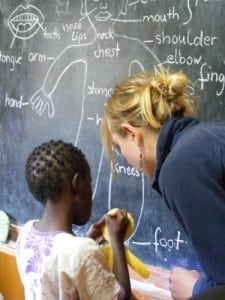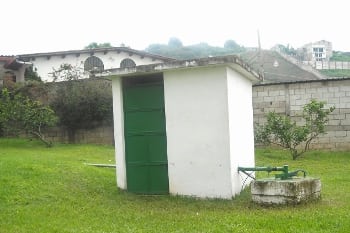UPDATE 9/6/2010: Please see the call for donations at the end.
When Patricia Schneidewind taught classes in Izinga, Tanzania, two years ago, she saw that the girls were less educated than boys. The gap was especially wide among impoverished girls and single mothers.
“I quickly noticed that there was no real possibility for young, single mothers to really help themselves become more financially stable, as they are often disowned from their families and remain unmarried” she wrote E4C in an email.
In response, Schneidewind has founded a non-profit secondary school for girls. But it wasn’t her idea: it arose from talks with the women of Izinga.
World’s lowest attendance
Education for young women is not a priority in Tanzania, according to a UN report. The cultural emphasis is on domestic chores and early marriage. At home, the women cook and clean rather than study. Girls from impoverished families often work as maids in upper class homes. Consequently, they perform worse than boys in primary and secondary school, especially in science and math.
School attendance in general is lower in sub-Saharan Africa than anywhere else in the world. There, only 63 percent of boy and 59 percent of girls go to school, UNICEF reports.
Schneidewind would like to change that with the Bakhita Girls secondary school, a non-profit that she and her partners founded. Within the next year, she hopes to have completed a school building for up to 240 young women. In five years, she believes that she can fill most of those seats. By then, she hopes to add a primary school as well.
Brought to you by cocoa beans
For now, there’s a “Donate” button on the Bakhita web site’s menu bar, and the project depends on the generosity of others. But the school may not always have to operate as a charity.
To cover its costs, Bakhita will also manage a non-profit cocoa company. Tanzania happens to be one of Africa’s leading cocoa producers, and Bakhita will harness the local industry to pay bills and provide jobs for the local community.
“If the model works, we would love to build similar schools in different regions,” Schneidewind said.
Seeking volunteers
A pilot program for the school begins this summer with 10-15 students. At the same time, Bakhita is working with volunteers to design the building. Schneidewind guesses that construction with locally available materials could cost about $400,000.
She is also designing a curriculum aimed at empowering women to work and become leaders in business and politics. She could use the help of talented volunteers in that or any facet of this project, including fundraising and building the school.
There are so many things they might need, she explained. “People themselves always know better what they can offer,” she added. She would like potential volunteers to speak to her directly about what they would like to do.
For more information, and to inquire about volunteering, please contact Schneidewind at patricia@bakhitagirls.com. To see more of Schneidewind’s beautiful photos, please visit our Flickr photostream.
UPDATE 9/6/2010: The project is developing quickly, Schneidewind says, and classes for 15 girls begin today. She requests donations to outfit the classroom and pay the teacher’s, cook’s and guard’s salaries while the program works toward financial self-sufficiency. Those interested can donate through a Pay Pal account on her site.



